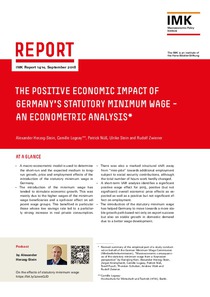The positive economic impact of Germany's statutory minimum wage : an econemetric analysis.

Herzog-Stein, Alexander ; Logeay, Camille ; Nüss, Patrick ; Stein, Ulrike ; Zwiener, Rudolf
Institut für Makroökonomie und Konjunkturforschung, Düsseldorf
IMK - Düsseldorf
2018
19 p.
minimum wage ; economic growth ; employment ; price
IMK Report
141
Wages and wage payment systems
English
Bibliogr.
"With the empirical analyses of the macroeconomic effects of the introduction of the statutory minimum wage in Germany, the IMK tries to determine the short-term and expected medium- to long-term growth, price and employment effects with the help of a macro-econometric model. As a result, economic growth tended to be stimulated by the introduction of the minimum wage. This was mainly due to the higher wages of the minimum wage beneficiaries and a spillover effect on adjoining wage groups. In particular, this benefited people whose low savings rate led to a particularly strong increase in real private consumption. The price increases triggered were negligible on a macroeconomic scale. At the same time, there was a significant structural effect away from mini-jobs towards additional employment subject to social security contributions, while the volume of work hardly changed in hours. A short-term VAR analysis identifies a significant positive wage effect for 2015, positive (but not significant) overall economic price effects as expected and a clearly positive but not significant effect on employment. The introduction of the statutory minimum wage has helped Germany to embark on a more stable growth course based not only on export success but also on stable growth in domestic demand thanks to better wage development."
Digital
See also
-
[Book]
Positive gesamtwirtschaftliche Effekte des gesetzlichen Mindestlohns - eine ökonometrische Analyse
/ 1 ; 1 ; 1 ; 1 ; 1.
IMK, 2018. - 20 p.
http://www.boeckler.de/
The ETUI is co-funded by the European Union. Views and opinions expressed are however those of the author(s) only and do not necessarily reflect those of the European Union or the ETUI.